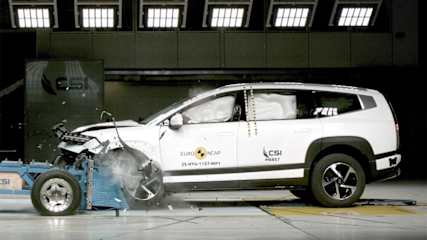Safety
.jpg)
Popular family SUV and van learn safety fate
Read the article
By Tim Gibson · 24 Sep 2025
A best-selling SUV and van have retained their five-star Australasian New Car Assessment Program (ANCAP) safety rating.
How common is the Holden Commodore ZB 'Shift to park' error?
Read the article
By David Morley · 19 Sep 2025
How common is the issue in the 2019 Holden Commodore ZB where the gear selector is in Park but a warning notice comes up “shift to park”? Until the light goes out, I can’t lock car or turn off the lights etc.
My 2010 Hyundai i30 airbag warning light stays on
Read the article
By David Morley · 19 Sep 2025
The airbag warning light stays on in my 2010 Hyundai i30
Is there going to be a recall on the GWM Tank 300?
Read the article
By David Morley · 19 Sep 2025
Is there any indication that there is going to be a recall on 2025 GWM Tank 300 for their indicator problem?
.jpg)
Big win for cut-price small cars!
Read the article
By Jack Quick · 10 Sep 2025
The Australasian New Car Assessment Program (ANCAP) has published its latest round of safety scores and the two vehicles included are re-tested versions of popular hatchbacks based on testing conducted by Euro NCAP.

Hyundai safety smashes the top-shelf barrier
Read the article
By James Cleary · 09 Sep 2025
Hyundai’s just-released Ioniq 9, a large, three-row electric SUV, has come through independent Australasian New Car Assessment Program (ANCAP) safety testing with a maximum five-star rating.Evaluated against the organisation’s latest 2025 protocols, the dual-motor, all-wheel drive six- and seven-seater 2026 Hyundai Ioniq 9 impressed across ANCAP’s four key pillars - Adult Occupant Protection (84 per cent), Child Occupant Protection (86 per cent), Vulnerable Road User Protection (77 per cent) and Safety Assist (85 per cent).In announcing the result ANCAP Chief Executive Officer Carla Hoorweg said, “Consumers and fleet buyers can be confident the Ioniq 9 provides high levels of protection for occupants, as well as other road users.”Adopting test results from sister organisation Euro NCAP, ANCAP called out numerous Ioniq 9 safety highlights including a stable passenger compartment in frontal offset testing and maximum points for protection of the driver in the full width and side impact tests.At the same time maximum points were awarded for child dummies in the frontal offset and side impact crash tests, with head-protecting airbags extending to the third row.The car’s active bonnet, designed to minimise injury in a pedestrian impact, also came in for special mention as did “high levels of performance across a range of collision avoidance test scenarios – particularly detection and crash mitigation with cyclists and motorcyclists”.Further detail on the Hyundai IONIQ 9's safety performance is available at www.ancap.com.au.

Peace of mind for new SUVs and utes!
Read the article
By Chris Thompson · 04 Sep 2025
The Australasian New Car Assessment Program (ANCAP) has published ratings for several new cars after crash testing new SUVs, a ute and a sedan.

Urgent recall issued for popular small car
Read the article
By Laura Berry · 03 Sep 2025
Hyundai Australia has issued an urgent recall for almost 20,000 examples of its i30 hatchback following the discovery of a fuel fault that could lead to a sudden loss of power.The fault affects only the i30 PD model made between 2020-2021 and involves 18,634 vehicles in Australia.Hyundai Australia has issued a statement explaining the fault is connected to the fuel supply which can cause the vehicle to lose power.“Due to a manufacturing defect, the fuel pump impeller may become deformed under certain environmental conditions, interrupting the fuel supply,” Hyundai’s statement reads. “If this occurs, the engine could stall resulting in a sudden loss of motive power.“Owners of affected vehicles will be contacted in writing by Hyundai Motor Company Australia (HMCA), asking them to schedule an appointment as soon as possible to have the fuel pump impeller inspected and replaced, free of charge.”Owners who may be concerned are encouraged to speak to their local dealer or contact Hyundai’s customer care line on 1800 186 306.The i30 has long been in Hyundai’s top three best-selling vehicles. Sales of the i30 year-to-date to the start of September have totalled 7447 units. Hyundai’s latest recall follows another recall in March for the 8700 ix35 SUVs due to a brake fluid leak.
_1.jpg)
7000-plus Teslas recalled for hazardous software fault
Read the article
By James Cleary · 03 Sep 2025
The Federal Department of Infrastructure, Transport, Regional Development, Communication and the Arts has issued a safety recall notice impacting 7301 examples of the Tesla Model Y sold new in Australia in 2025.

Five-star ANCAP without hitting the wall!
Read the article
By James Cleary · 19 Aug 2025
The latest safety assessment results released by the Australasian New Car Assessment Program (ANCAP) have confirmed maximum five-star results for a trio of recent arrivals - the Kia Carnival, Mercedes-Benz E-Class and Skoda Superb.




